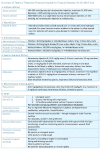The management of tetanus in adults in an intensive care unit in Southern Vietnam
- PMID: 34136651
- PMCID: PMC8185581
- DOI: 10.12688/wellcomeopenres.16731.2
The management of tetanus in adults in an intensive care unit in Southern Vietnam
Abstract
Background: Tetanus remains common in many low- and middle-income countries (LMICs) yet the evidence base guiding management of this disease is extremely limited, particularly with respect to contemporary management options. Sharing knowledge about practice may facilitate improvement in outcomes elsewhere. Methods: We describe clinical interventions and outcomes of 180 adult patients ≥16 years-old with tetanus enrolled in prospective observational studies at a specialist infectious diseases hospital in Southern Vietnam. Patients were treated according to a holistic management protocol encompassing wound-care, antitoxin, antibiotics, symptom control, airway management, nutrition and de-escalation criteria. Results: Mortality rate in our cohort was 2.8%, with 90 (50%) patients requiring mechanical ventilation for a median 16 [IQR 12-24] days. Median [IQR] duration of ICU stay was 15 [8-23] days. Autonomic nervous system dysfunction occurred in 45 (25%) patients. Hospital acquired infections occurred in 77 (43%) of patients. Conclusion: We report favourable outcomes for patients with tetanus in a single centre LMIC ICU, treated according to a holistic protocol. Nevertheless, many patients required prolonged intensive care support and hospital acquired infections were common.
Keywords: ICU; LMIC; Tetanus; intensive care unit; low middle income country; management; treatment.
Copyright: © 2021 Hao NV et al.
Conflict of interest statement
No competing interests were disclosed.
Figures
References
Grants and funding
LinkOut - more resources
Full Text Sources


